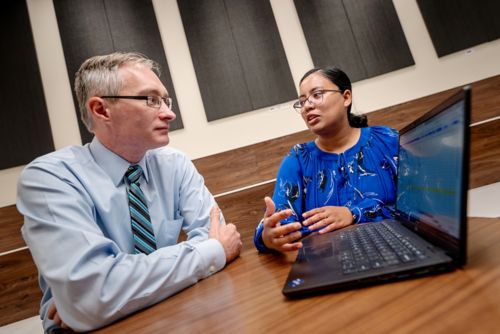St. Jude Family of Websites
Explore our cutting edge research, world-class patient care, career opportunities and more.
St. Jude Children's Research Hospital Home

- Fundraising
St. Jude Family of Websites
Explore our cutting edge research, world-class patient care, career opportunities and more.
St. Jude Children's Research Hospital Home

- Fundraising
Gang Wu Lab
Using bioinformatics and statistical approaches to identify genetic variants contributing to disease.
About the Wu lab
Copious amounts of genetic information can now be amassed due to advances in next-generation sequencing technology. However, these data must be organized in a way so that they can be used to answer important biological questions. Our lab employs a multi-omics integrated approach to translate and analyze large volumes of data in meaningful ways so that we can better understand normal development and molecular drivers or modifiers of disease.
In the news
Researchers develop a computational tool to find risk genes for rare diseases. Read about it.
In the news
Scientists discover a genetic variant that enables ALS recovery. Find out more.
In the news
Learn more about the Center for Applied Bioinformatics.
Our research summary
Advances in technology have allowed us to gather large volumes of data that we can leverage to answer unique genomic questions. From ascertaining the gene expression of a single cell all the way up to deciphering the genetic complexity of the human immune response, we can now collect a remarkable amount of information.

Each set of data is important in helping us understand the landscape of normal development as well as identify genetic variability and molecular drivers of disease. Bioinformatics and machine learning techniques are instrumental in categorizing and translating the vast amount of collected data into meaningful biological information that can inform treatment strategies for our patient population.
My team sits at the crossroads of technology, genomics, programming and statistical analysis. We focus on translating the information captured by various technological platforms and integrating it to more accurately predict biological processes and events occurring within cells and within individuals.
Multi-omics integration
We are a multifaceted team consisting of biologists, computer scientists and mathematicians. Our collaborative body of expertise produces unique perspectives that can be applied to research questions. This has resulted in data with less artifacts, higher confidence and bigger impacts in the clinical realm.
Our ability to build pipelines with carefully considered filters and analyses produces meaningful data that can help us pinpoint important genetic variants contributing to disease.

Neurological diseases
Lack of a control cohort is a common challenge in rare disease research. We recently created a synthetic control cohort to understand the sources of artifacts from sequencing, mapping and variant calling, allowing us to use the summary statistics from public databases as the control for rare variant burden tests. By ensuring that we have a large control group in which to compare, our novel rare variant analysis framework (CoCoRV) can more accurately identify genes carrying rare, deleterious genetic variants enriched in rare diseases and that typically do not have large sample sizes.
Our group is applying our expertise to study motor neuron diseases such as amyotrophic lateral sclerosis (ALS). ALS is a rare neurodegenerative disease with no cure. Recently, our group helped identify a novel genetic modifier that is associated with the reversal of ALS. This finding provides a promising lead for potential therapeutic targets for ALS.
Genome instability
When a genome has a propensity to acquire mutations, genomic instability ensues, and this is a hallmark of aging as well as cancer. Instability can arise from point mutations, indels or chromosomal rearrangements, all of which can have significant impact on the overall health of the individual. We are interested in leveraging technology and using an evolutionary lens to model genomic instability, especially the complex genomic rearrangements in extrachromosomal circular DNA, and understand how these DNA alterations manifest over time.
Learn more
Publications
Contact us
Gang Wu, PhD
Associate Member, St. Jude Faculty
Director, Center for Applied Bioinformatics
Department of Pathology
MS 1122, Room MP116
St. Jude Children's Research Hospital

Memphis, TN, 38105-3678 USA GET DIRECTIONS